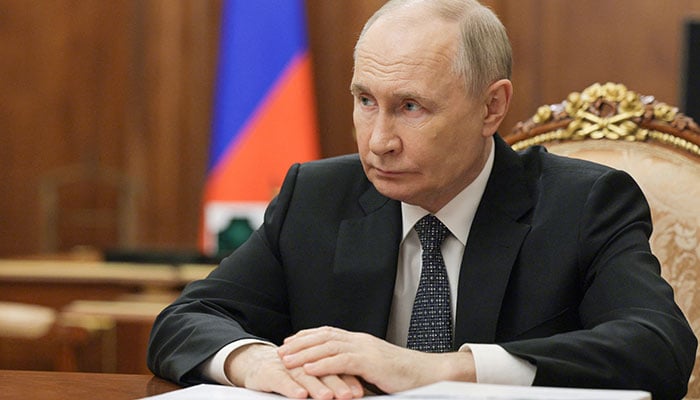Putin refuses to discuss Israeli-US plot to kill Iran's supreme leader
“I do not even want to discuss this possibility," says Putin replying to query of possibility of Israel killing Khamenei
June 19, 2025

ST PETERSBURG: President Vladimir Putin has refused to talk about claims that Israel and the United States may try to kill Iran’s Supreme Leader Ayatollah Ali Khamenei.
He said the Iranian people are standing by their leaders in Tehran.
Israeli Prime Minister Benjamin Netanyahu has openly speculated that Israel’s military attacks could result in regime change in Iran, while US President Donald Trump said on Tuesday that the US knew where Khamenei was “hiding” but that Washington was not going to kill him “for now”.
Asked what his reaction would be if Israel did kill Khamenei with the assistance of the United States, Putin said: “I do not even want to discuss this possibility. I do not want to.”
When pressed, Putin acknowledged he had heard the remarks about possibly killing Khamenei but repeated that he did not want to discuss them.
“We see that today in Iran, with all the complexity of the internal political processes taking place there... that there is a consolidation of society around the country’s political leadership,” Putin told senior news agency editors in the northern Russian city of St Petersburg.
Putin said all sides should look for ways to end hostilities in a manner that ensured both Iran’s right to peaceful nuclear power and Israel’s right to the unconditional security of the Jewish state.
Putin was speaking as Trump kept the world guessing whether the US would join Israel’s bombardment of Iranian nuclear and missile sites, while residents of Iran’s capital streamed out of the city on the sixth day of the air assault.
He said he had been in touch with both Trump and Netanyahu, and that Moscow had shared its ideas on resolving the conflict while ensuring Iran’s continued access to civil nuclear energy.
Iranian nuclear facilities
Questioned about the prospect of regime change in Iran, Putin said that before embarking on such a path, one must assess whether the core objective was truly being achieved.
He added that Iran’s underground uranium enrichment facilities remained untouched.
“These underground factories, they exist, nothing has happened to them,” Putin said.
“It seems to me that it would be right for everyone to look for ways to end hostilities and find paths for all parties to this conflict to reach an agreement,” he said. “In my opinion, in general, such a solution can be found.”
Asked whether Russia was prepared to provide Iran with modern weapons to defend against Israeli strikes, Putin said the strategic partnership treaty signed with Tehran in January did not include military cooperation, and Iran had not submitted any formal request for assistance.
Russian Deputy Foreign Minister Sergei Ryabkov said on Wednesday that Moscow was urging the United States not to strike Iran, warning that such action would radically destabilise the Middle East.
A spokeswoman for the Russian Foreign Ministry also warned that Israeli strikes on Iranian nuclear facilities risked triggering a nuclear catastrophe.
Putin said Israel had assured Moscow that Russian specialists helping to build two additional reactors at the Bushehr nuclear power plant in Iran would not be harmed in any air strikes.
He added that Moscow had “a very good relationship with Iran” and that Russia could safeguard Iran’s interests in the nuclear energy field.
Russia has offered to take enriched uranium from Iran and to supply nuclear fuel for its civil energy programme.
“It is possible to ensure Iran’s interests in the field of peaceful nuclear energy, and at the same time, to address Israel’s concerns about its security,” Putin said. “We have outlined them (our ideas) to our partners from the USA, Israel and Iran.”











